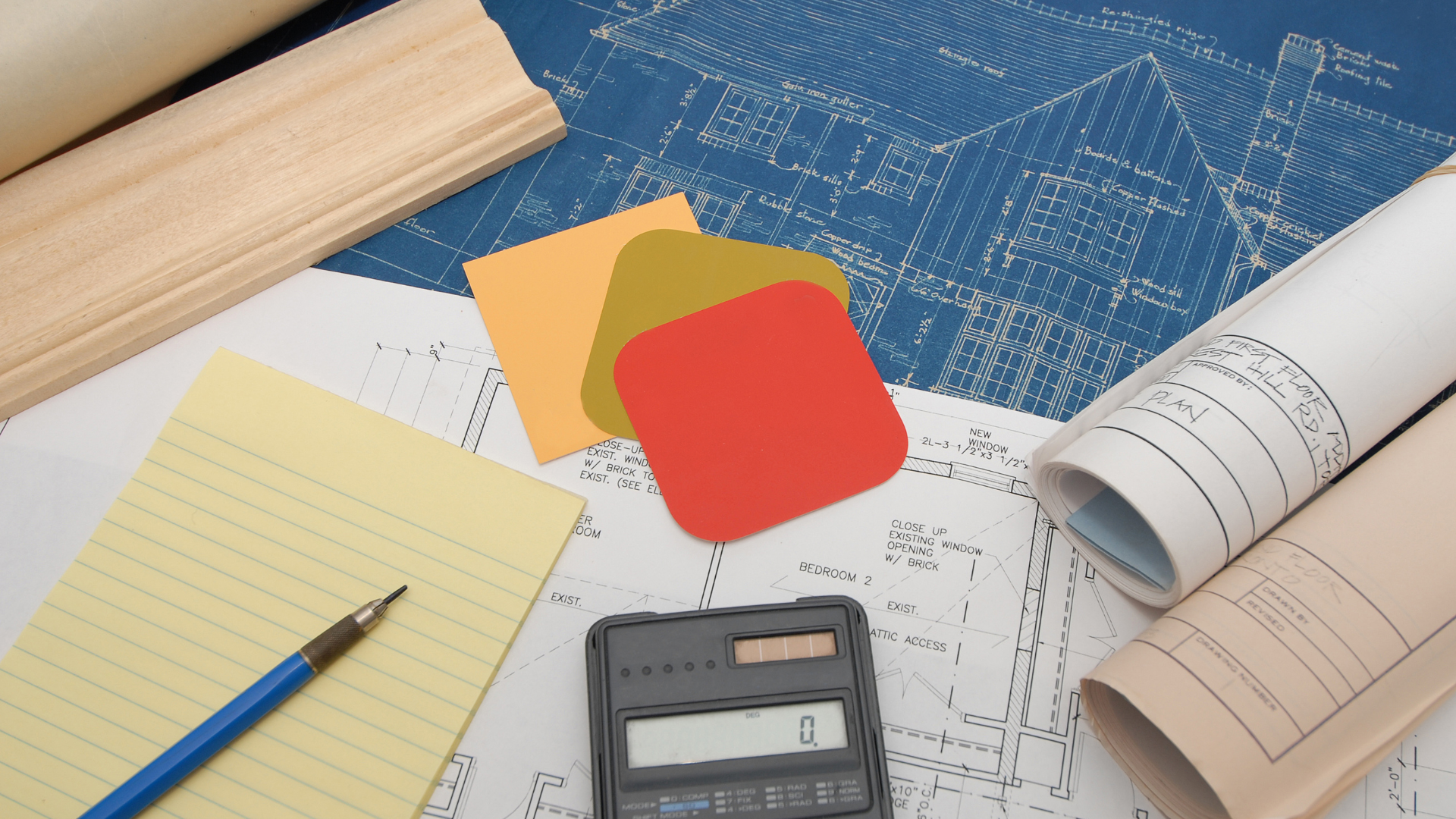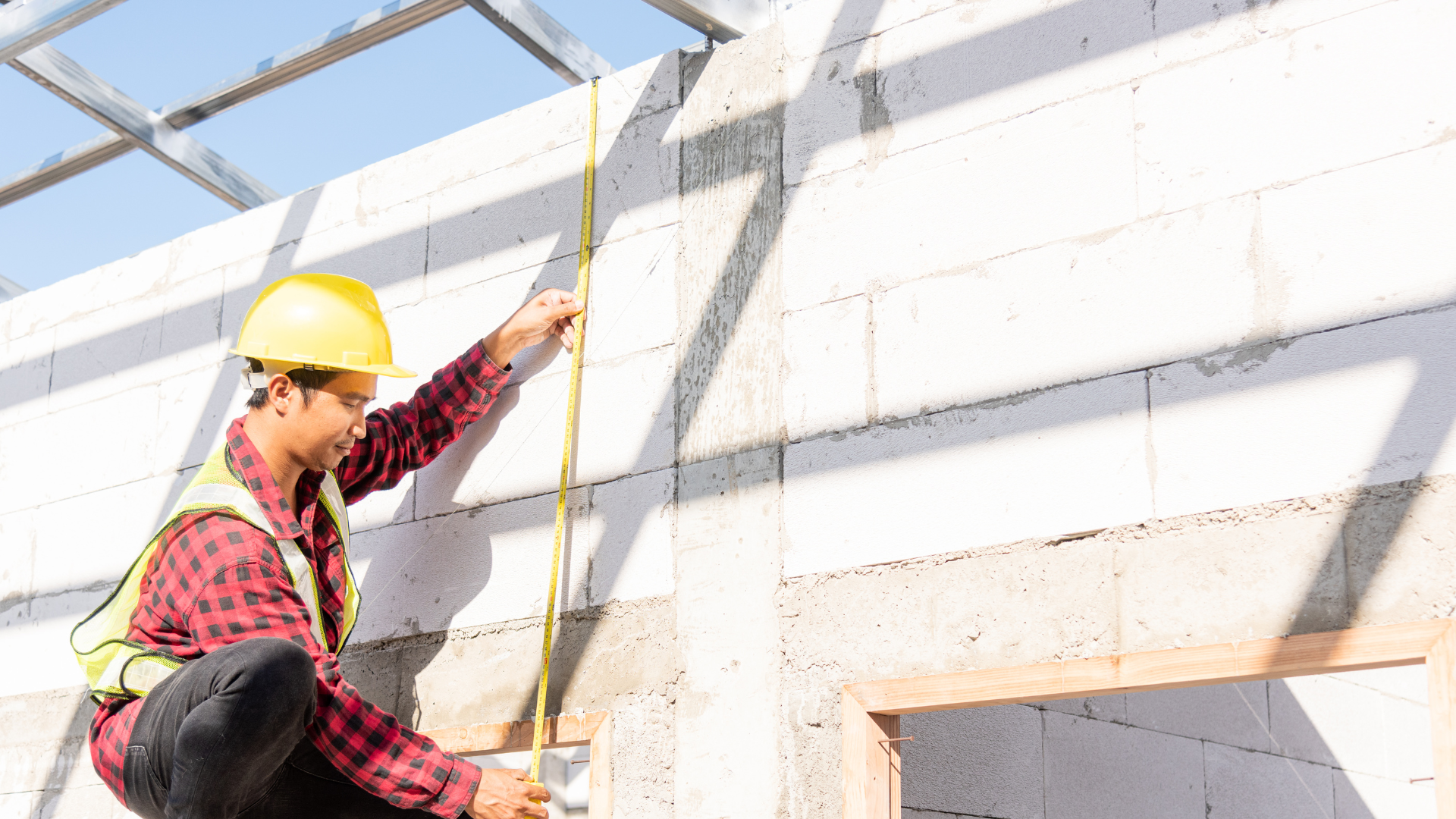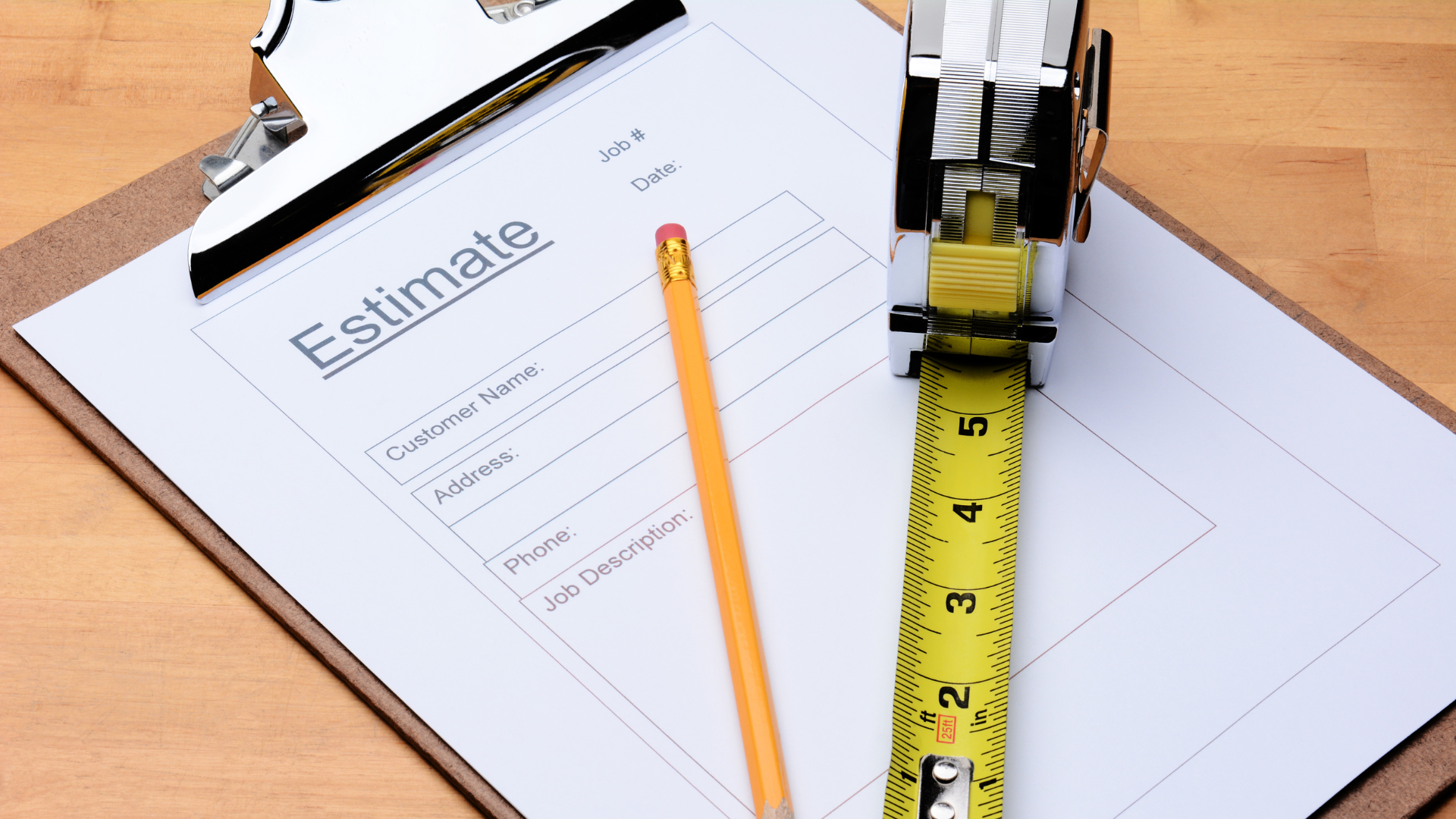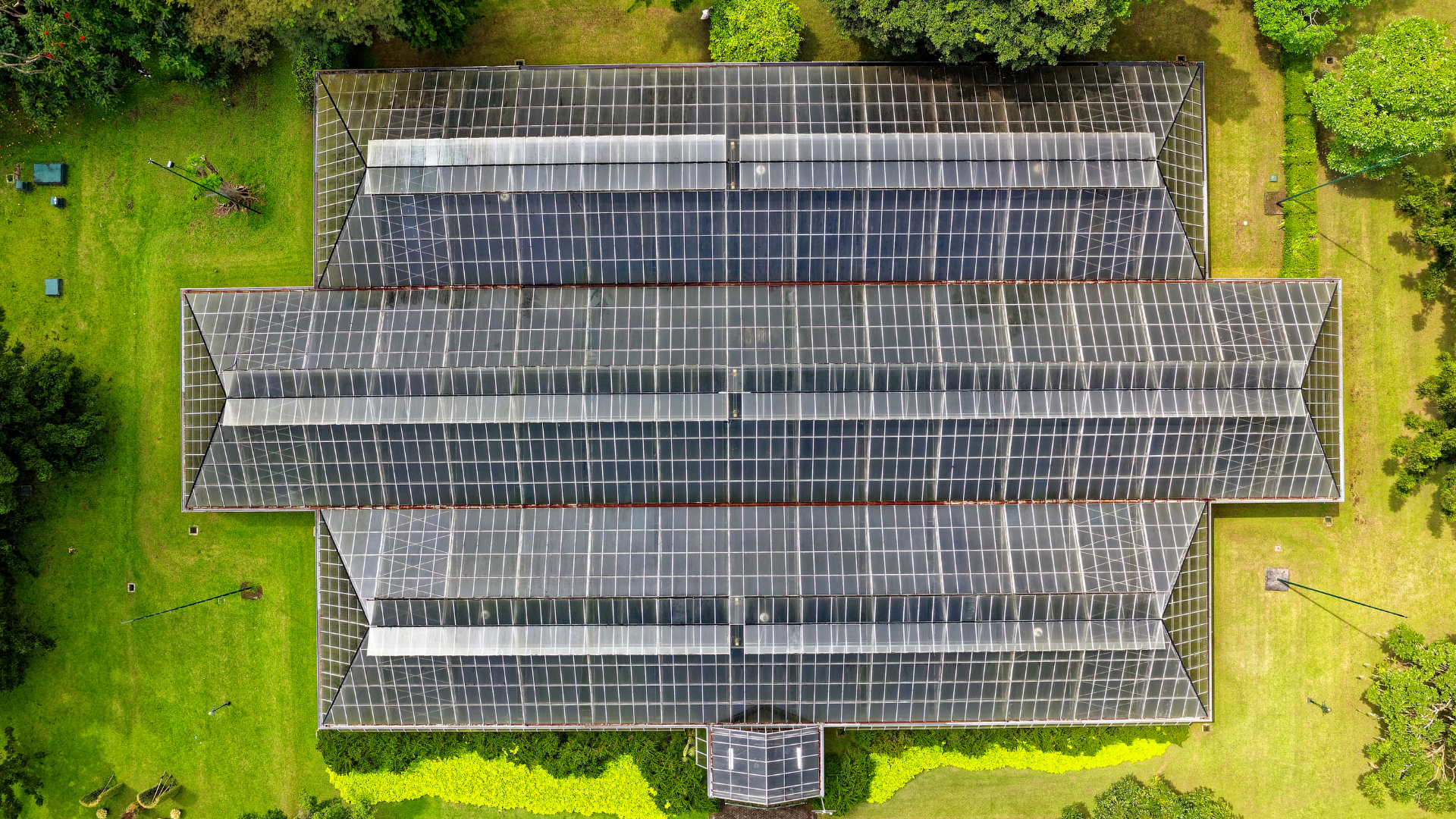April 23, 2025
In the roofing industry, moving leads, job scheduling, sales processes, and keeping customers happy can feel like trying to manage all the tools simultaneously.
This is where Roofing CRM software becomes invaluable.
Just imagine all your customer interactions, roofing jobs, project details, and scheduling information in a single place, accessible whenever you need to create a successful roofing project.
Using roofing CRM software is not just about keeping up with sales; it's about differentiating your roofing business and increasing your success.
So, what are the top benefits of implementing a Roofing CRM? Let’s dive in.
Quick Wins: Key Takeaways at a Glance
- The Hidden Struggles: Running a roofing business without a CRM leads to inefficiencies in lead tracking, scheduling, communication, etc.
- How a Roofing CRM Transforms Your Business: Implementing a roofing-specific CRM system streamlines operations, enhances customer relationships, etc.
- How to Choose the Right Roofing CRM: Select the ideal CRM for your roofing business, assess your operational needs, prioritize essential features, etc.
- Rooferbase is an all-in-one roofing CRM that streamlines operations by centralizing lead management, enhancing communication, and providing mobile access.
The Hidden Struggles: What Happens When You Don’t Have a Roofing CRM?

If you run a business without a CRM system, you may encounter several large issues:
1. Lost Leads & Revenue
It can be difficult to follow up with new clients and prospects systematically without a centralized platform for tracking estimate requests, materials, and potential job issues.
You may miss the opportunity to follow up with new clients, therefore rates or missed revenue will drop below what is acceptable.
2. Project Scheduling Nightmares
Without an organized place to schedule roofing jobs and manage job sites, project overlaps and unfair workloads can happen, and that could cost you potential new profits and business growth.
3. Communication Gaps
Time and communication gaps can occasionally be a problem for roofers because there are no real-time updates.
All of this increases the chances of mistakes during project iterations and miscommunication among stakeholders.
4. Overwhelming Paperwork
Manually managing estimates, invoices, and contracts slows everything down, and relying on paperwork without digital integration only adds more headaches and increases the chance of errors.
5. Cash Flow Blocks
Tracking payments can be inefficient, and unfair or inconsistent payment practices can leave you behind, even when those payments should have been part of your regular workflow.
6. Inability to Make Meaningful and Consistent Business decisions
When data is inaccurate or inconsistent, it can lead to errors in the decision-making process, especially when job completion metrics and sales figures don’t align.
This inconsistency can also introduce bias, making it harder to make informed, reliable decisions.
7. Challenges of Scaled Growth
When a business grows and the workload increases, but you don’t have a roofing CRM platform, it becomes difficult to manage the rising demand, leading to inefficiency and potential client dissatisfaction.
Check this out: Common Roofing Mistakes Contractors Make & How to Avoid Them
Turning the Tide: How a Roofing CRM Benefits Your Business
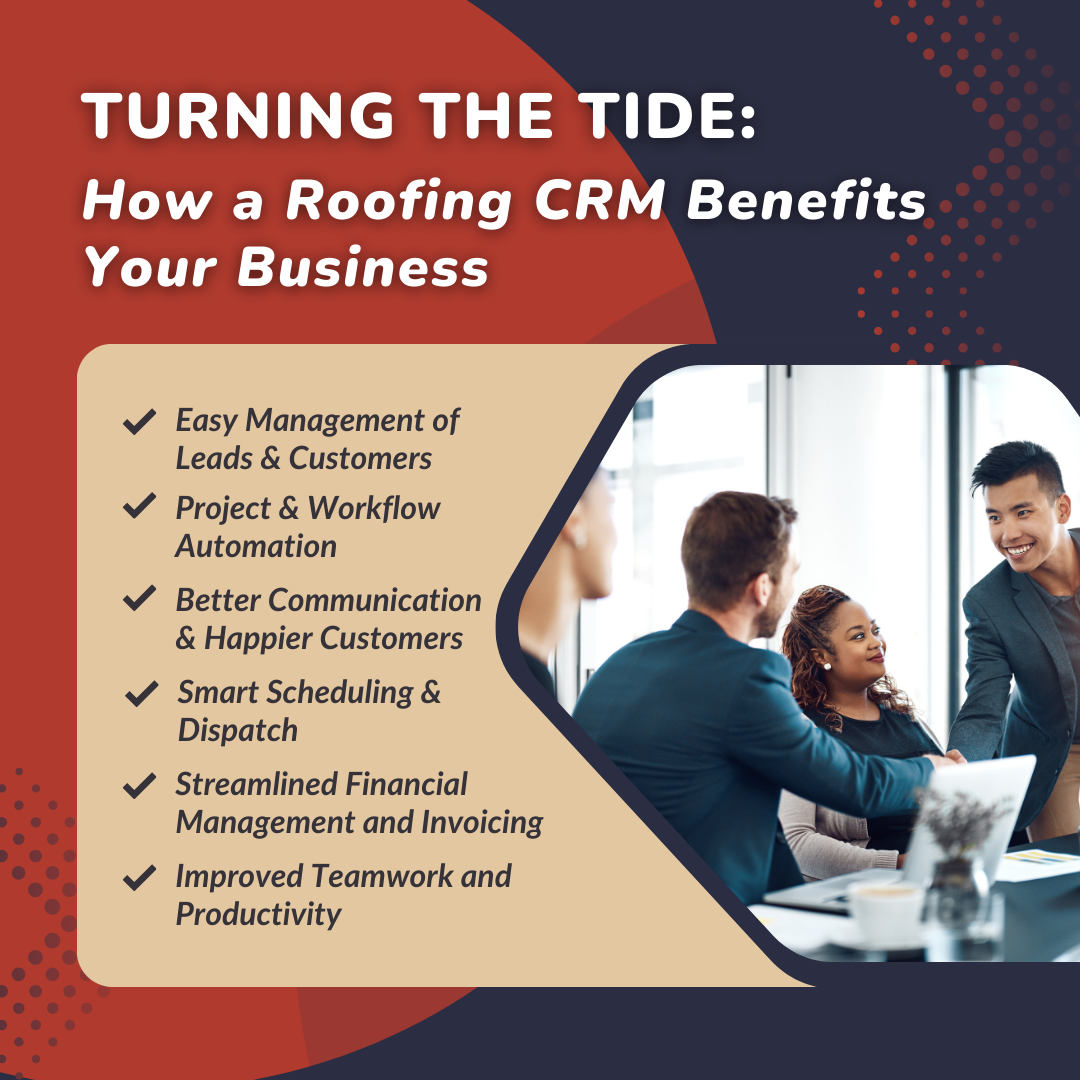
A Roofing CRM designed specifically for roofing companies has the potential to change the way you work and achieve significant growth.
Here’s how software tools help in working smarter:
1. Easy Management of Leads & Customers
A roofing CRM collects all information in one platform, such as contact details, past correspondence, and completed work, with a focus on achieving higher close rates.
Keeping everything organized ensures that nothing gets missed, follow-ups are timely, and client service is personalized.
2. Project & Workflow Automation
A great CRM can often automate repetitive tasks and ensure processes are consistent and clear, which helps avoid potential human errors.
Automated scheduling, allocations, and workflows ensure jobs are executed in a timely manner, with no time or resources, like material orders, being wasted.
3. Better Communication and Happier Customers
A CRM allows you to collect and store all communications in one place, which improves response speed.
All communications can be tracked to ensure that any issues a roofer may have are addressed in a timely and effective manner, which helps build trust and improve customer satisfaction.
4. Smart Scheduling & Dispatch
Automated scheduling features prevent double booking, skipping text messages or missed phone calls, and ineffective use of resources.
The efficiency that is created through scheduling and dispatching the sales team ultimately results in happier roofers and greater productivity.
5. Streamlined Financial Management and Invoicing
Invoicing and billing can be integrated into roofing software to streamline financial functions.
Automated invoices with payment tracking reduce administrative burdens, improve the accuracy of billing processes, and decrease payment delays, which in turn improve cash flow.
6. Improved Teamwork and Productivity
A roofing software connects the entire sales team, including in-field team members, production personnel, and office staff, which fulfills internal communication and collaboration needs.
This connectivity improves teamwork and ensures better alignment across a team, resulting in a more productive team.
7. Understanding Analytics to Drive Growth
Being able to pull reports and analytics on the analytics dashboard allows the team to make informed decisions.
They will understand the trends in sales, project performance, and their clients' preferences, allowing for more strategic growth and confidence to scale.
8. Tracking Materials & Inventory
A CRM can help the roofing company manage its materials and inventory by tracking the amount of products used and current stock levels.
This helps avoid running out of materials when you need them and also prevents ordering too much that just sits unused. It ensures you have the right materials at the right time to meet demand.
9. Warranty & Service Management
When you use a CRM solution for managing warranties and after-sales projects, things become simpler and more organized.
It keeps track of warranty periods for materials, service requests, and maintenance schedules, allowing you to strengthen long-lasting relationships with roofers.
10. Safety & Compliance Tracking
CRM solutions for roofing can track safety processes and compliance documentation to ensure that all projects are implemented according to roofing industry guidelines.
This reduces risks and shows that you are committed to the safety initiatives required.
Check this out: How a Roofing CRM Can Transform Your Business Operations
Finding Your Perfect Fit: How to Choose the Right Roofing CRM

Choosing the right Roofing CRM software is an important part of improving your roofing operation.
Below are steps for selecting the best roofing CRM:
1. Evaluate Your Business Needs
Start by analyzing your roofing business as it currently exists to identify what needs improvement.
Consider aspects such as project management, communication, and accounting.
2. Determine Key CRM Features
Once you have completed your assessment, determine which CRM features are most important to alleviating your specific challenges:
- Lead Management and Tracking: An Organizational tool to capture, organize, and follow up on leads to increase conversion rates.
- Mobile Access: Provides field teams with on-site access to update information, allowing for quick communication and timely responses to material or client requests.
- Estimates and Proposals: Quickly generate professional and accurate estimates and proposals to accelerate sales and increase revenue.
- Integration: Provides a system that can easily integrate with existing tools like accounting software and other marketing platforms at one location.
3. Assess User Experience and Support
The interface must be user-friendly so your roofing team can easily adopt and use it. A simple interface will also reduce training time.
Look for a CRM for the roofing industry that is easy to navigate and has plenty of available support resources.
4. Think about Scalability
Look for a flexible model that allows you to add features and users as your business grows; this will save you from having to change the system later on.
5. Evaluate Costs and Return on Investment (ROI)
While budgeting is important, it's also essential to consider the value a CRM brings to your business.
Evaluate the potential ROI of any CRM by assessing whether its features can improve efficiency, strengthen client relationships, and boost profitability.
6. Ask for Demos and Trials
When it's time to consider a final purchase, take advantage of free demos and trials from the CRM provider.
The hands-on experience will help you rate the usability, functionality, and alignment of your process.
Check this out: The Ultimate Guide to Roofing Software in 2025
Rooferbase: The Game-Changer for Roofing Businesses
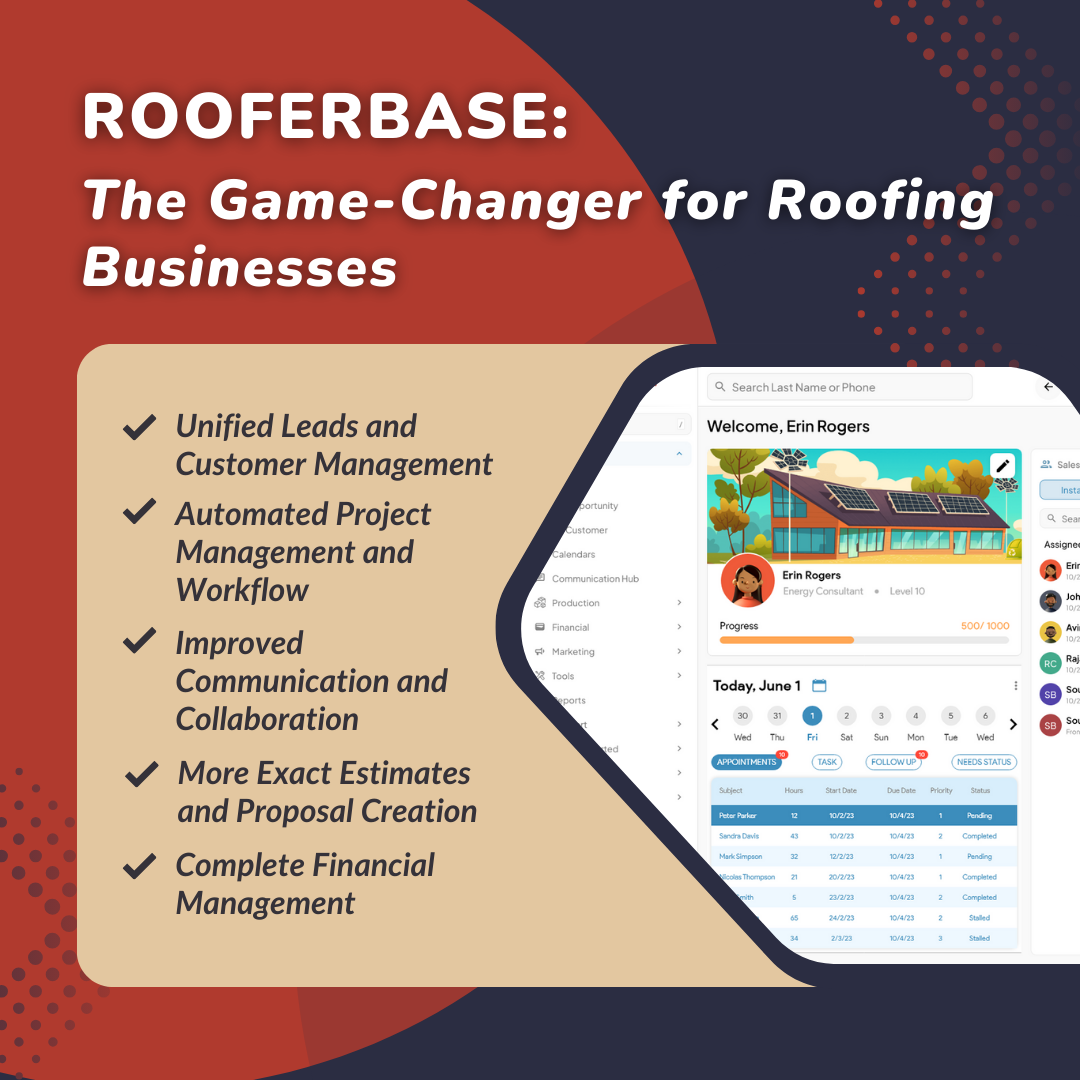
Rooferbase is an all-in-one platform for roofing software developed to improve the operational functions of roofing companies. Below is a thorough overview of its purposes and benefits:
1. Unified Leads and Customer Management
Rooferbase software manages every interaction and leads to a centralized, organized platform, ensuring that no sales lead goes unattended.
This keeps all follow-ups time-sensitive, improving conversion ratios and attracting new leads.
2. Automated Project Management and Workflow
Automates a project to eliminate human errors in scheduling, task assignment, and progress tracking.
It streamlines workflows, ensures project timelines align with industry standards, and enhances overall operational efficiency.
3. Improved Communication and Collaboration
Rooferbase enables roofers and company clients to communicate efficiently in real-time, featuring a centralized communication hub that increases transparency and fosters trust among all parties involved in the project.
4. More Exact Estimates and Proposal Creation
Allows roofers to create exact estimates for material orders and professional proposal templates, saving time during the sales process and adding a greater degree of professionalism to presentations.
5. Complete Financial Management
CRM system is integrated with invoicing and payment processing, making it easy to pay and integrate financing.
Meeting invoicing and payment reminders creates a consistent cash flow and helps save time on administrative duties.
6. Data-Informed Decision Making
Provides customizable reporting and analytics tools, offering insights into sales performance and project profitability.
This insight brings informed strategic planning and growth.
7. Mobile Accessibility
Allows field teams to access and update project information from anywhere.
This access allows all roofers to get the latest information wherever they are.
With its industry-specific features and user-friendly design, Rooferbase is sure to change the game for many roofing professionals who want to improve their business processes.
Read here: Best Roofing Software for Customer Management in 2025
In a Nutshell: Your Roadmap to Roofing Success
Roofing is tough, your systems shouldn’t be.
A roofing CRM clears the clutter, speeds things up, and keeps your team and clients on the same page. Less chaos, more closed jobs.
Simple switch. Big difference. Let the results speak for themselves.
Your Next Move: Take Control of Your Roofing Business Today!
You just read the top benefits, now experience them.
Rooferbase isn’t just any CRM. It’s built for roofing pros who want fewer headaches, faster turnarounds, and happier clients.
Make the move to Rooferbase, and let your business run smoother, smarter, and stronger.
FAQs:
1. What is a Roofing CRM system and how does it work?
A Roofing CRM (Customer Relationship Management) system helps roofing contractors manage leads, track project progress, schedule appointments, automate follow-ups, and centralize customer information—all in one platform. It streamlines business operations and improves customer satisfaction.
2. How can a Roofing CRM improve lead management and sales conversion?
A Roofing CRM automates lead tracking, sends instant follow-ups, and scores leads based on engagement. This ensures sales reps focus on high-potential prospects, improving overall conversion rates and reducing response times.
3. What are the key features to look for in a Roofing CRM?
Important features include lead management, project tracking, calendar scheduling, mobile access, document storage, proposal generation, and integration with accounting or marketing tools. Customization and ease of use are also essential.
4. How does a Roofing CRM help roofing businesses save time and money?
By automating repetitive tasks, reducing manual data entry, and improving team collaboration, a Roofing CRM saves hours of admin work. This boosts productivity and reduces costly errors, ultimately saving money.
5. Is a Roofing CRM system suitable for small roofing companies?
Yes, Roofing CRMs are beneficial for businesses of all sizes. Many platforms offer scalable features tailored to the needs of small and growing roofing contractors, helping them compete more efficiently.

